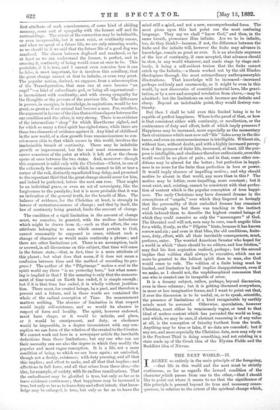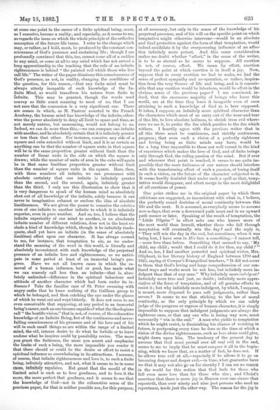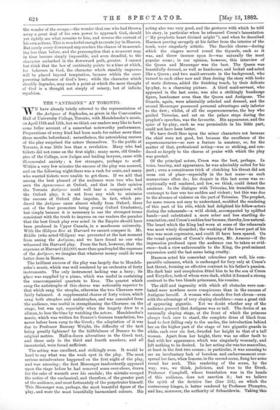THE NEXT WORLD.—II.
IAGREE so entirely in the main principle of the foregoing, —that life in this world and the next mast be strictly continuous, so far as regards the inward condition of the character which passes from one to the other,—that I should like to point out where it seems to me that the significance of this principle is pressed beyond its true and necessary conse- quences, in relation to the extent of the spiritual change which, at some one point in the career of a finite spiritual being, must, as I conceive, become a reality; and especially, as it seems to me, as regards the issue on which the whole principle of the orthodox conception of the future life turns. I refer to the change which may, or rather, as I hold, must, be produced by the constant con- sciousness of God's presence and sustaining life ; though I am profoundly convinced that this, too, cannot come all of a sudden. to any mind, or come at all to any mind which has not served a long apprenticeship to the teaching that the rule of an infinite righteousness is behind " the painted veil which those who live call life." The writer of the paper dismisses this consciousness of God's presence, as not, in reality, changing the conditions of the question, for this reason,—that any finite mind must be always utterly incapable of such knowledge of the In- finite Mind, as would transform his nature from finite to infinite. This may be granted, though the words used convey so little exact meaning to most of us, that I am not sure that the concession is a very significant one. There are senses in which, as M. Pasteur asserted in the French Academy, the human mind has knowledge of the infinite, other- wise the power absolutely to deny all limit to space and time, as not merely untrue, but unmeaning, would not belong to us. Indeed, we can do more than this,—we can compare one infinite with another, and be absolutely certain that it is infinitely greater or lees than that other. For instance, conceive any side of a square and cube extended without limit, and it is as certain as anything can be that the number of square units in that square will be in the same proportion greater without limit than the number of linear units in the side on which the square is drawn ; while the number of units of area in the cube will again be in that same limitless proportion greater without limit than the number of square units in the square. Here, then, with three numbers all infinite, we can pronounce with absolute certainty that one infinite is infinitely greater than the second, and the second, again, infinitely greater than the third. I only use this illustration to show that it is very dangerous to speak of the human mind as absolutely shut out of all knowledge of the infinite, solely because it can never in imagination exhaust or enclose the idea of absolute limitlessness. We are given the power to conceive the relation even of one infinite to another infinite to which it is infinitely superior, even in pure number. And so, too, I believe that the infinite superiority of one mind to another, in an absolutely infinite number of different relations, does not in the least ex- clude a kind of knowledge which, though it be infinitely inade- quate, shall yet have an infinite (in the sense of absolutely limitless) effect upon our character. It has always seemed to me, for instance, that temptation to sin, as we under- stand the meaning of the word in this world, is literally and absolutely inconsistent with such knowledge of the perpetual presence of an infinite love and righteousness, as we antici- pate in some period at least of an immortal being's pro- gress. Have we not all known cases in which the re- moval of a human influence, bad or good, has made what we can scarcely call less than an infinite—that is, abso- lutely unlimited—difference in the spiritual behaviour and attitude of another character which had been under its in- fluence Take the familiar case of St. Peter swearing with angry oaths that he knew nothing of the Galilean group to which he belonged, and then catching the eye under the glance of which he went out and wept bitterly. It does not seem to me even conceivable that supposing, at any period in an immortal being's career, such an one became capable of what the theologians call " the beatific vision," that is, not, of coarse, of the exhaustive knowledge of an Infinite Being, but of the continuous and never- failing consciousness of his presence and of his love and of his will in such small things as are within the range of a limited mind, the old, intense desire to do what he forbids or to leave undone what he inspires could by possibility revive. The more you grant the finiteness, the more you assert and emphasise the limits of such a being, the more impossible you render it that there should or could be the desire or effort to resist a spiritual influence so overwhelming in its attractions. I assume, of course, that infinite righteousness and love is, to such a finite being, infinitely attractive, and not, what it seems to be in some eases, infinitely repulsive. But grant that the mould of the limited mind is such as to love goodness, and to love it the more, the more perfect that goodness, and it seems to me that the knowledge of God—not in the exhaustive sense of the previous paper, for that is neither possible nor, for this purpose, at all necessary, but only in the sense of the knowledge of his perpetual presence, and of his will on the specific point on which temptation might otherwise intervene—would be an absolute and final protection against the form of that temptation, would indeed annihilate it by the overpowering influence of an affec- tion infinitely more potent. And this same consideration makes me doubt whether " effort," in the sense of the writer, is to be as eternal as he seems to suppose. All exertion is not, of course, effort. We mean by effort, exertion beyond the point at which exertion is in itself a joy. Now, suppose that in every exertion we had to make, we had the sense of perfect sympathy and co-operation, or rather, inspira- tion from the very Source of life and being, and is it conceiv- able that any exertion would be laborious, would be effort in the obvious sense of the previous paper ? I am convinced, in- deed, that the enormous majority of beings who leave this world, are at the time they leave it incapable even of soon attaining to such a knowledge of God as is here supposed. It takes, I suppose, an infinitely more spiritual character than the characters which most of us carry out of the wear-and-tear of this life, to love absolute holiness, to shrink from evil where- ever we see it, to prefer the fire which purifies to the fire which withers. I heartily agree with the previous writer that in all this there must be continuous, and strictly continuous, progress ; that even such a vision of a perfectly righteous and loving being as finite minds may have, would be for a long time impossible to those not well versed in the kind of experience which makes the love of God, and of finite beings only through God, the ruling passion of the mind. But if ever and wherever that point is reached, it seems to me quite im- possible that the mere finiteness of our nature should interfere with the transforming effect of such a passion, of losing itself in such a vision, on the future of the character subjected to it. It seems hardly doubtful that under such a spell as that, temp- tation would disappear, and effort merge in the most delightful of all exertions of power.
One point strikes me in the original paper by which these criticisms are suggested, as inconsistent with what is, I believe, the perfectly sound doctrine of moral continuity between this life and the next. It is assumed, as everybody seems to assume now-a-days, that even a downward path must end in an upward path sooner or later. Speaking of the result of temptation, the " Little Pilgrim" in effect asks one who knows more of the next world than herself, whether those who fall through temptation will eventually win the day? and the reply is, " They will win the day in the end, but sometimes, when it was being lost, I have seen in His face a something,—I cannot tell, —more love than before. Something that seemed to say, My child, my child ; would that I could do it for thee, my child I' And so, too, I find another powerful and spiritual writer, Mrs. Oliphant, in her literary history of England between 1790 and 1825, saying of Cowper's Evangelical teachers, " It did not occur to them that God's loving and large comprehension of our con- fused ways and works must be not less, but infinitely more in- dulgent than that of any man." Why infinitely more indulgent? Infinitely more true and just, no doubt ; infinitely more appre- ciative of the force of temptation, and of all genuine efforts to resist it; but why infinitely more indulgent, by which, I suppose, is meant, more disposed to pass soft judgments, rather than severe ? It seems to me that sticking to the law of moral continuity, as the only principle by which we can safely judge of the progress or regress of human character, it is simply impossible to suppose that indulgent judgments are always the righteous ones, or that any one who is losing way now, must necessarily " win in the end." A man who yields to temptation which he might resist, is diminishing his chance of resisting in future, is postponing every time he does so the time at which a vision of the divine righteousness, such as love alone could give, might dawn upon him. The tendency of the present day to assume that God must prevail over all real evil in the end, seems to me to imply that he most conquer it all in the begin- ning, which we know that, as a matter of fact, he does not. If he allows true evil at all,—especially if he allows it to go on becoming deeper and deeper evil,—in time, what guarantee have we that it may not also go on for eternity ? I can see no reason in the world for this notion that God feels for those who fall even more love than for those who rise ; and Christ's assertion that there is more joy in Heaven over one sinner that repenteth, than over ninety and nine just persons who need no repentance, tends just the other way. The reason for the joy is
the wonder of the escape,—the wonder that one who had thrown away a great deal of his own power to approach God, should yet rightly use what remains to him, and reverse the current of 'his own actions. This is wonderful enough to create joy in Heaven. But surely every downward step renders the chance of re-ascend- ing less than before, and the presumption that a re-ascent may in time become simply impossible, and even dreadful, to the character embarked in the downward path, greater. I cannot but think that the law of continuity points to a time at which, for believers in God, the character which steadily improves will be placed beyond temptation, because within the over- powering influence of God's love ; while the character which steadily degrades, may reach a point at which the mere thought of God is a thought not simply of misery, but of infinite repulsion.




































 Previous page
Previous page